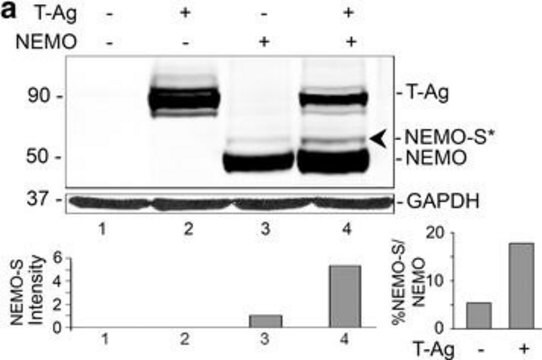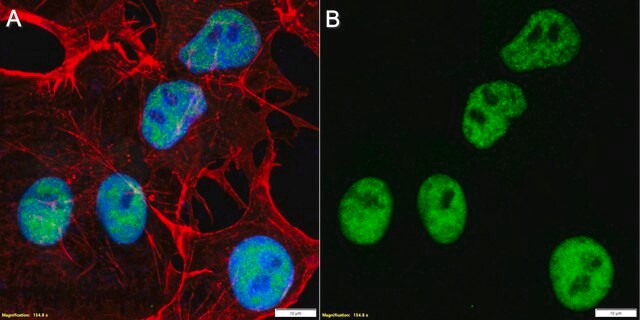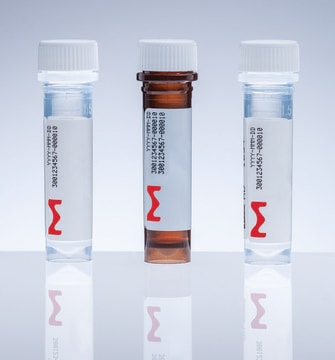SRP2093
SV40 T-antigen from simian virus
recombinant, expressed in insect cells, ≥80% (SDS-PAGE)
Sign Into View Organizational & Contract Pricing
All Photos(1)
About This Item
UNSPSC Code:
12352202
NACRES:
NA.77
Recommended Products
biological source
simian virus
recombinant
expressed in insect cells
Assay
≥80% (SDS-PAGE)
form
frozen liquid
mol wt
~83.3 kDa
packaging
pkg of 5 μg
storage condition
avoid repeated freeze/thaw cycles
concentration
400 μg/mL
color
clear colorless
NCBI accession no.
UniProt accession no.
shipped in
dry ice
storage temp.
−70°C
Gene Information
simian virus ... SV40gp6(1489531)
Biochem/physiol Actions
The large T antigen (TAg) of Simian virus 40 acts as an initiator of DNA replication, participates in cellular transformation, and induces cell growth. A number of functional domains have been characterized including the N-terminal J domain, nuclear localization signal (NLS), internal helicase domain, Rb and topoisomerase I interacting domain, p53 and ATP binding domain. The p53-interacting domain is also essential for binding p300/CBP. Phosphorylation of TAg by several kinases may regulate its function both positively and negatively.
The viral replication of simian virus 40 (SV40) is carried out by a single protein, T-antigen. This feature makes the virus a useful system for understanding the process of replication and to identify the components of replication machinery. It functions as a DNA helicase along with a cellular single-strand DNA binding protein and topoisomerase I or II, leading to extensive origin unwinding and formation of a pre-initiation complex. The T-antigen associates with two tumor suppressor proteins, p53 and the retinoblastoma protein pRb, and inactivates them.
Physical form
Clear and colorless frozen liquid solution
Preparation Note
Use a manual defrost freezer and avoid repeated freeze-thaw cycles. While working, please keep sample on ice.
Storage Class Code
10 - Combustible liquids
WGK
WGK 1
Flash Point(F)
Not applicable
Flash Point(C)
Not applicable
Certificates of Analysis (COA)
Search for Certificates of Analysis (COA) by entering the products Lot/Batch Number. Lot and Batch Numbers can be found on a product’s label following the words ‘Lot’ or ‘Batch’.
Already Own This Product?
Find documentation for the products that you have recently purchased in the Document Library.
Time-sensitive reversal of hyperplasia in transgenic mice expressing SV40 T antigen.
Ewald D
Science, 273, 1384-1386 (1996)
Interaction of DNA polymerase alpha-primase with cellular replication protein A and SV40 T antigen.
Dornreiter I
The Embo Journal, 11, 769-776 (1992)
Simian virus 40 large T antigen: the puzzle, the pieces, and the emerging picture.
E Fanning
Journal of virology, 66(3), 1289-1293 (1992-03-01)
H H Chao et al.
Molecular and cellular biology, 20(20), 7624-7633 (2000-09-26)
At least three domains of simian virus 40 large T antigen (TAg) participate in cellular transformation. The LXCXE motif of TAg binds to all members of the retinoblastoma protein (pRB) family of tumor suppressors. The N-terminal 70 residues of TAg
Z Q Pan et al.
The Journal of biological chemistry, 271(36), 22111-22116 (1996-09-06)
The replication of simian virus 40 (SV40) DNA in vitro requires a trimeric single-stranded DNA (ssDNA)-binding protein called HSSB or RPA. HSSB supports the unwinding of DNA containing the SV40 origin in the presence of the viral-encoded T antigen and
Our team of scientists has experience in all areas of research including Life Science, Material Science, Chemical Synthesis, Chromatography, Analytical and many others.
Contact Technical Service








